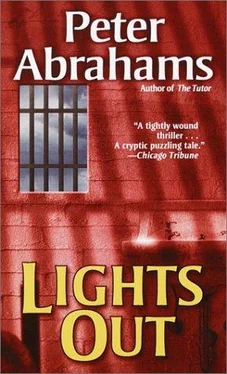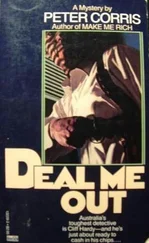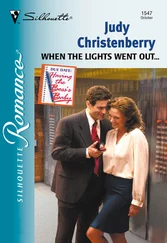Peter Abrahams - Lights Out
Здесь есть возможность читать онлайн «Peter Abrahams - Lights Out» весь текст электронной книги совершенно бесплатно (целиком полную версию без сокращений). В некоторых случаях можно слушать аудио, скачать через торрент в формате fb2 и присутствует краткое содержание. Год выпуска: 2002, ISBN: 2002, Издательство: Fawcett Books, Жанр: Триллер, на английском языке. Описание произведения, (предисловие) а так же отзывы посетителей доступны на портале библиотеки ЛибКат.
- Название:Lights Out
- Автор:
- Издательство:Fawcett Books
- Жанр:
- Год:2002
- ISBN:978-0345445780
- Рейтинг книги:4 / 5. Голосов: 1
-
Избранное:Добавить в избранное
- Отзывы:
-
Ваша оценка:
- 80
- 1
- 2
- 3
- 4
- 5
Lights Out: краткое содержание, описание и аннотация
Предлагаем к чтению аннотацию, описание, краткое содержание или предисловие (зависит от того, что написал сам автор книги «Lights Out»). Если вы не нашли необходимую информацию о книге — напишите в комментариях, мы постараемся отыскать её.
Lights Out — читать онлайн бесплатно полную книгу (весь текст) целиком
Ниже представлен текст книги, разбитый по страницам. Система сохранения места последней прочитанной страницы, позволяет с удобством читать онлайн бесплатно книгу «Lights Out», без необходимости каждый раз заново искать на чём Вы остановились. Поставьте закладку, и сможете в любой момент перейти на страницу, на которой закончили чтение.
Интервал:
Закладка:
“I like it here.”
“So do I, believe me. But I’m insane.” She walked toward the parking lot. He followed.
Karen drove. Eddie sat beside her. Jazz played. He wondered if she would reach out for him, touch his knee, hold his hand. She didn’t. After half an hour or so, she slowed the car and turned into a lane marked by two gateposts with carved owl heads on top.
“I just have to drop in on someone for a few minutes first,” said Karen, “if that’s all right with you.”
“First before what?”
“Before we go on.”
It was all right with him.
At the end of the lane was a big stone house with three chimneys. Karen parked in front of it. Her spine straightened, as though she was steeling herself for something unpleasant.
“Do you want me to wait in the car?”
“No.”
They got out, walked to the front door. Karen rang the bell. There was a small bronze plaque under it, very small, considering the size of the door, the house, the grounds. Eddie read it: “Mount Olive Extended Care Residence and Spa.”
The door was opened by a woman in a nurse’s outfit. Karen gave her name.
“This way, please,” said the nurse.
They followed her down a long parquet hall, past many rooms, into a library at the end. The room was furnished with leather chairs and couches, a Persian rug, and books from floor to ceiling. There was no one in it except a woman sitting at a table near the fire, bent over a jigsaw puzzle that was mostly open spaces.
“You have visitors, dear,” said the nurse.
The woman looked up. She had stringy hair, a gaunt face, unfocused eyes. Was there something familiar about her?
Karen approached the woman and took her hand. “Hello, Mrs. Nye,” Karen said.
The woman stared up at her. “Do I know you?” Her voice was familiar too; Eddie remembered a plane ride long ago, over an emerald sea. The woman had lost her tan and her self-confidence, but she still had her makeup and her painted nails. She looked at Eddie and smiled.
“Is this your husband?” she said to Karen.
It was Evelyn Packer.
19
“On second thought,” said Evelyn, picking up a puzzle piece, “he couldn’t be your husband-he looks like someone I know rather all too well.” She studied the piece for a moment, then slipped it down the front of her blouse.
“Now, now, Evelyn,” said the nurse: “We’ll never finish our puzzle that way, will we?”
“It’s not our puzzle,” Evelyn said. “It’s mine.”
The nurse started to say something, but Karen interrupted. “Thanks for showing us in.”
The nurse closed her mouth and backed out of the room, shutting the door behind her.
Karen pulled up a chair and sat at the table opposite Evelyn. Evelyn picked out another puzzle piece and tried it in several spaces. The borders of the puzzle were done-they were black-and there were clusters of black pieces here and there, some of them silvered. There was also a white shape, somewhat triangular, that might have been a mountaintop. Evelyn’s piece wouldn’t fit. She handed it to Karen and said: “Did you know my father?”
“I never had the pleasure.”
“Don’t be smarmy. Just yes or no.”
“No.”
“You-know-who killed him. He was a fine man. A good man. He never abused me in any way, not the mental way or the physical way or the sexual way. Unlike a certain aforementioned I could mention.” Her gaze rose, fastened for a moment on Eddie. Then she looked quickly away and whispered to Karen, a symbolic whisper, audible to anyone in the room: “Who is he?”
“Don’t you know?” said Karen.
“Whisper.”
Karen lowered her voice. “Don’t you know?”
“How would I? I’m not exactly in circulation. What’s the date today?”
Karen told her. Evelyn nodded, as though receiving news at once bad and unsurprising, then found the thread of the conversation. “I don’t even know you either, although you’ve been visiting lately.”
“Karen. Karen de Vere.”
“Evelyn. Evelyn Andrea Manning Packer Nye. Looks like hell, wants to die.”
“Don’t talk like that, Evelyn.”
She brightened. “No problemo . What ax are you grinding, Karen? Or is that just the sound of your teeth?” She started laughing, with the expectation that others would join in. None did.
“No ax, Evelyn,” Karen said. “But your father died of heart disease, according to the hospital records.”
“Driven to it,” said Evelyn, “by the aforementioned unmentionable.”
“Driven to heart disease?”
“You’ve never heard of stress?”
Eddie had been standing by the door, perfectly still on the outside, reeling within. He spoke: “Karen.”
Both women looked up at the sound of his voice. There was fear in Evelyn’s eyes; perhaps it wasn’t entirely absent from Karen’s either.
“I want to talk to you.”
Karen rose.
“Oo,” said Evelyn. “Big manny-man.” Then she had another look at Eddie and said, “Sorry.” Karen followed Eddie to the door. As they went out, Eddie heard Evelyn murmur, “Mental, physical, sexual.”
Eddie and Karen stood in the hall outside the library. “What’s going on?” Eddie said.
“In the old days they called it madness. Now we say dysfunctional.”
“That’s not what I meant. I meant what are you doing? Why did you bring me here?”
“I thought you could help me.”
“Do what?”
“Shed some light on her situation.”
“Why would I be able to do that?”
“Because you’re her brother-in-law.”
“I don’t know her.”
“How is that possible? She’s been married to your brother for fourteen years. Besides, you already said you did.”
Eddie looked down into Karen’s eyes, saw complexity. Bits of information-Evelyn’s father and his connections, her madness, the $230,000 check-popped up in his mind but refused to cohere. All he knew was that he was being set up. He didn’t know how, why, or by whom, he just knew it was happening.
Karen put her hand on his arm. “Whatever you’re thinking, stop,” she said. “I meant what I told you at the pond.”
“Did you?” Eddie said. “I think you were pumping me.”
“No.”
Eddie shook off her hand. “And I don’t think Jack called me what you said he did. You invented that, just to divide us.”
Karen’s voice rose. “Think what you want.”
Down the hall a door opened. A man came out. He had a sandy mustache. Eddie recognized him from the health club: he’d peeked twice through the window of the steam bath, once before Karen entered, once after. Now he was here, living proof. Karen waved him away, too late.
“Where’s the woman in the pink leotard?” Eddie said.
“What are you talking about?” Karen said, but her eyes shifted.
“And next time you’re pretending to be blind as a bat, don’t let anyone see your contacts.”
“Everything all right?” said the man with the sandy mustache, coming down the hall.
“Please, Eddie,” Karen said, “I’ve got to talk to you.”
“I don’t talk to cops.”
“I’m not a cop.”
“He is.”
One of the mustached man’s hands disappeared inside his jacket. Arrest, Eddie knew, was next. Arrest, trial, prison. He knew the drill.
Eddie didn’t think. He just let things happen. Things like snatching the tortoiseshell glasses off Karen’s face and flinging them at the mustached man.
“Hold it right there,” the man said.
Things like moving, the way he could move. The mustached man had time to get his gun out, but not raise it, before Eddie hit him. The mustached man went down. Instant disorder. Eddie ran from it, down the parquet hall, past many rooms, to the front door, out. He kept going, down the lane, through the gateposts with the carved owl heads on top, into some woods across the road. There he stopped, listened for sounds of pursuit. Hearing none, he stayed where he was.
Читать дальшеИнтервал:
Закладка:
Похожие книги на «Lights Out»
Представляем Вашему вниманию похожие книги на «Lights Out» списком для выбора. Мы отобрали схожую по названию и смыслу литературу в надежде предоставить читателям больше вариантов отыскать новые, интересные, ещё непрочитанные произведения.
Обсуждение, отзывы о книге «Lights Out» и просто собственные мнения читателей. Оставьте ваши комментарии, напишите, что Вы думаете о произведении, его смысле или главных героях. Укажите что конкретно понравилось, а что нет, и почему Вы так считаете.












